Features
Dialectics for a fast evolving scenario
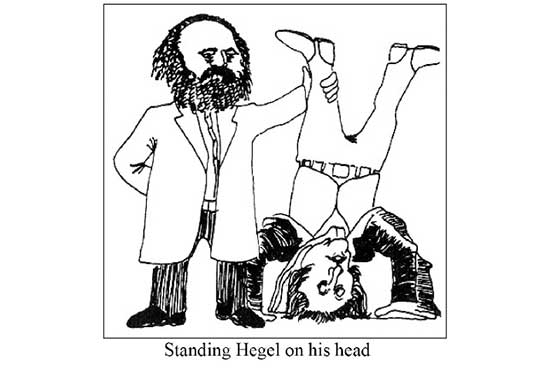
by Kumar David
“The question whether objective truth can be attributed to human thinking is not a question of theory; it is a practical question. Man must prove the truth — i.e. the reality and power, the ‘this-sidedness’ of his thinking in practice. The dispute over the reality or non-reality of thinking that is isolated from practice is a scholastic question”. Second Thesis on Feuerbach
Don’t turn away, this is not going to be a boring treatise in abstract Marxism. I will quickly get to my topic, which is that the political circumstances we are living through are evolving rapidly and we should be alert and adjust to changing situations. First however allow me a few paragraphs about Lenin’s most dynamic years, from February 1917 till he fell seriously ill in late 1921. He died in January 1924 due to complications from bullets lodged in him in Fanny Kaplan’s August 1918 assassination attempt. The February Revolution, (old Julian-style last week of February to early March, new Gregorian-style second week of March) took Lenin and the Bolshevik Party by surprise. When first the women and then the workers of Petrograd fired up leaderless demonstrations which overthrew the monarchy, the Bolsheviks who had prepared the proletariat for revolution for 30 years were stunned! Except Trotsky the general expectation among socialists was a Two Stage Revolution; first Tsarism would be replaced by the rule of the bourgeoisie, then it would be the turn of the subaltern classes – a common at the time static misreading of Marx’s dialectical thinking.
I see developments in Sri Lanka moving fast with unforeseen changes and a regime that most of us last year considered strong and stable, now tottering. Of course it’s going to fall tomorrow but it’s wobbling and the domestic environment is changing unpredictably. Catholics are visibly angry about an alleged “cover up of Easter bombing organisers” (https://www.youtube.com/watch?v=EA2Zl1mVrOo); the in the Buddhist clergy have counter-attacked the Cardinal 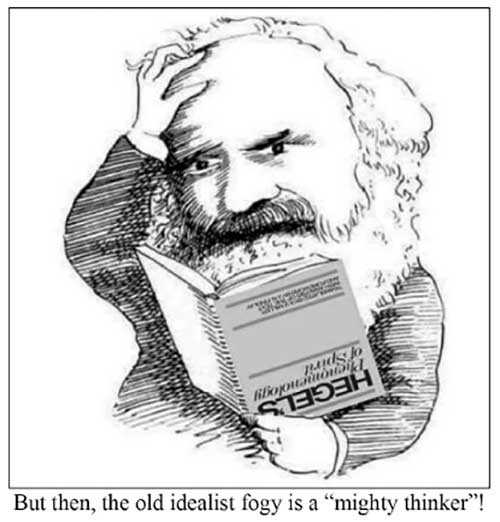 (https://www.youtube.com/watch?v=OC0WcSiJiJs0). Farmers in several areas are on the warpath according to News First. Furthermore nobody foresaw in 2019 the havoc covid would wreak, and the ferocity of UNHRC denunciations was unexpected. It is true that red lights were flashing about debt servicing and that the economy was in hopeless straights, but the convergence of bad news has been more rapid than foreseen and the regime has quickly gone belly up. All who join a mission with a single simple objective, to protect democracy, perforce, have to adjust to a fast changing scenario. The ability to think and act on one’s feet is what makes Lenin of 1917-1921 interesting. He remains the star disciple of Sun Tzu’s Art of War, a fifth century BC classic on strategy. While shifting and manoeuvring Lenin never lost sight of his final objectives. This is why I call him the dialectic on two feet.
(https://www.youtube.com/watch?v=OC0WcSiJiJs0). Farmers in several areas are on the warpath according to News First. Furthermore nobody foresaw in 2019 the havoc covid would wreak, and the ferocity of UNHRC denunciations was unexpected. It is true that red lights were flashing about debt servicing and that the economy was in hopeless straights, but the convergence of bad news has been more rapid than foreseen and the regime has quickly gone belly up. All who join a mission with a single simple objective, to protect democracy, perforce, have to adjust to a fast changing scenario. The ability to think and act on one’s feet is what makes Lenin of 1917-1921 interesting. He remains the star disciple of Sun Tzu’s Art of War, a fifth century BC classic on strategy. While shifting and manoeuvring Lenin never lost sight of his final objectives. This is why I call him the dialectic on two feet.
Often in this column I have referred to the dialectic as the scientific method; true but how boring! Yes true enough Darwin, the best example in science was an assiduous and utterly trustworthy accumulator of data but with a mind that was alive to how phenomena change and evolve. Gautama Buddha pointed out that nothing is permanent and that all things are evolving but it took Darwin to work out the precise mechanisms by which this was happening in biology. Still, the dialectics of science and nature are slow moving. It is not exciting, it won’t keep you awake at night. Conversely, jumping from Two-Stage theory to instant proletarian revolution on April 1, 1917, capturing state power in October in defiance of scholastic Marxism, pushing back against attempts to militarise the trade unions and the refusal to give the Germans whole swathes of land so as to commit to the treaty of Brest-Litovsk (on both Trotsky erred), and in 1921 forcing through the New Economic Policy, a key market oriented concession to capitalist farming, these were momentous strategic transitions, quite breathtaking.
Bearded boring Bolshies 100 years ago, what’s it got to do with us you ask? I’ll tell you. The commonality is that quite unexpectedly we find ourselves in a very fast changing scenario. Lenin in 1917-1922, was an embodiment of the dialectic because he was able to think on his feet and keep his side united using his singular ability to deal with a swift change while the other side (sides to be more accurate) were confused and splintered. This is a useful example for those who seek a democratic, plural and united Sri Lanka because to date this side (I call it ‘we’) have managed to keep our message consistent and united while the ‘other’ side is splintering. President Gota bemoans his unpopularity and his inability to address challenges because “there is no unity” or some such words. I don’t have a clue what skulduggery is going on within the Royal Rajapaksa dynasty, though now is just the right time to make visible adjustments. The public is persuaded that Gota failed because he is inexperienced and his inner circle is dumb; Mahinda and Basil deftly keep out of the limelight. Less and less do you hear from those you marvelled 18 months ago that Gota as the incarnation of a strong leader who would lead Lanka to harmony and splendour? Lee Kuan Yew was a frequently quoted prototype. Where have all those people gone? On the other hand the opposition to an authoritarian new constitution, to excessive deployment of retired military brass and those worried that democracy is under threat (harassment of rights workers, fear in the mind of critics, damaging the judiciary) have succeeded in retaining a degree of commonality.
The shot in the arm for ‘our’ side was the UNHRC Commissioner’s Report and the Geneva Resolution which has de facto created a united front of Sri Lankan domestic forces and international opinion. The uprising in Burma and the opposition to authoritarianism in Sri Lanka must not allow themselves to be intimidated by reactionary nationalists who shriek about foreign support and anti-national traitors. International assistance should be accepted on our terms and in any case democracy is a universal clause. Remember that when the Germans offered to transport Lenin from Switzerland to Petrograd in a sealed train (“Like a bacillus” in Churchill’s words) he did not hesitate for a moment to accept the offer. The rest is history. In Burma as in Sri Lanka the defeat of the Junta or the containment of an assault on democracy are transnational tasks. “Patriotism is the last refuge of the scoundrel” when it is used to conceal the machinations of dictators.
You may recall Marx’s quip about standing Hegel on his head which in today’s language we would say has gone viral. It is about the relationship between real life on one hand and theories and philosophies on the other. Tamil agitation and at an extreme the LTTE was not an ideology of a separate state and Tamil cultural-civilisation finding expression in an uprising. Quite the converse, it was the practical conditions of a community creating such angst that it gave rise to extreme nationalism among a large number. That Sinhala-Buddhist chauvinist extremism which is holding this country hostage is about ancient civilisation, about hela jathika abimane is humbug. There were class, economic, employment in the late colonial capitalist and state economies, and education sectors which turned Sinhala blood blue with national pride. The nationalists who pontificate the opposite need to be stood on their heads. This critique of what is called the idealism (Ideas and philosophy is what determines the principal features of the real, material world) is very well known now and I think modern bourgeois sociology goes a long way towards recognising it.
What is perhaps not quite so well appreciated is that Marx was more a pupil than a critique of Hegel (not the post-Hegel epigenomes of course) in respect of the dialectic. He speaks of Hegel as a “mighty thinker” in the 1873 post-face to capital I. Certainly spurned the “the ill-humoured, arrogant, and mediocre epigones” who treated Hegel like “dead dog”. What Marx took away from Hegel was how to understand change, the dynamics of how change progresses. The conflicts and compromises in real social and human relations which at times mediate and at times determine how the history of societies evolves. The sociological companion to Darwinian evolution.
We are now live in a fruit salad world of international relations where three powers will decide our fate – over which we have little control – India, China and the US. They are each no doubt pondering what to do about our fruitcake regime. Competition among them to one side, it is in the interests of all three to unscramble this tabbouleh and avert this country’s descent into a failed-state abyss, which thankfully we have still not reached. It is not possible that they each do not have calculations up their sleeves about how to sort out this mess but an initiative from the regime itself proposing a via media to the UNHRC and to the aforementioned powers as proof that Lanka will accept its reconciliation-accountability responsibilities and will maintain a foreign policy balance which will not discomfit any great power will ease a compromise.
The Double-Paksa (two Rajapaksa) regime must forget about enacting a divisive new constitution to claw power into the grasp of the Executive; if firing military sorts already hired for top slots is infeasible at least it must give an undertaking that there will be no more sounding brass speaking in garbled tongues; it must put scientists in charge of pandemic control and win, as Biden seems to be doing; dump this squalid and reckless foreign policy team; it must stop manipulating the judiciary and halt asinine Presidential Commission circuses; it must stop pandering to extremists since this impedes a deal with the minorities. All this is doable if the executive is restructured and a plural orientation is adopted. If the government wishes to pull itself up by its bootstraps it must undertake the policy changes outlined in this para, restructure its personnel, pray much harder and offer trays of mangoes to the deities superintending Sri Lanka. The $64K question is whether Gota has the appetite for this healthy and fruitful menu. Those with no confidence that Gota’s Executive, Mahinda’s government or Basil-in-waiting can extricate themselves from their predicaments, must plan and act on their own outside this purview. The sole self-imposed condition is that change must be constitutional; what’s the point of a fight for democracy if one begins by abrogating it?
Features
Meet the women protecting India’s snow leopards
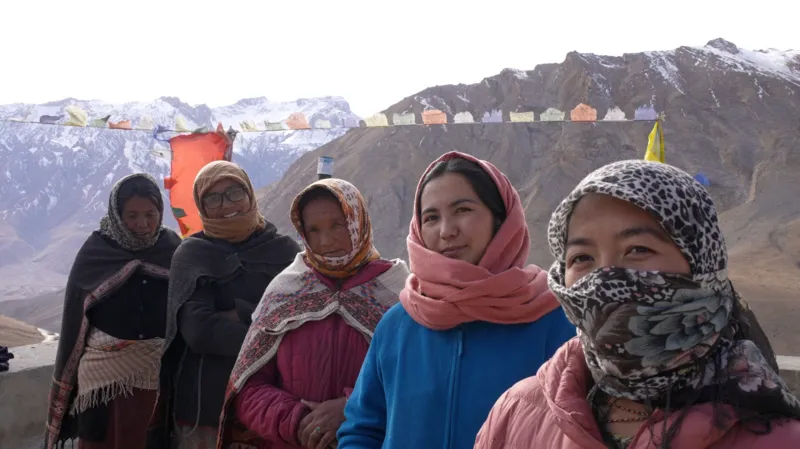
In one of India’s coldest and most remote regions, a group of women have taken on an unlikely role: protecting one of Asia’s most elusive predators, the snow leopard.
Snow leopards are found in just 12 countries across Central and South Asia. India is home to one of the world’s largest populations, with a nationwide survey in 2023 – the first comprehensive count ever carried out in the country – estimating more than 700 animals, .
One of the places they roam is around Kibber village in Himachal Pradesh state’s Spiti Valley, a stark, high-altitude cold desert along the Himalayan belt. Here, snow leopards are often called the “ghosts of the mountains”, slipping silently across rocky slopes and rarely revealing themselves.
For generations, the animals were seen largely as a threat, for attacking livestock. But attitudes in Kibber and neighbouring villages are beginning to shift, as people increasingly recognise the snow leopard’s role as a top predator in the food chain and its importance in maintaining the region’s fragile mountain ecosystem.
Nearly a dozen local women are now working alongside the Himachal Pradesh forest department and conservationists to track and protect the species, playing a growing role in conservation efforts.
Locally, the snow leopard is known as Shen and the women call their group “Shenmo”. Trained to install and monitor camera traps, they handle devices fitted with unique IDs and memory cards that automatically photograph snow leopards as they pass.
“Earlier, men used to go and install the cameras and we kept wondering why couldn’t we do it too,” says Lobzang Yangchen, a local coordinator working with a small group supported by the non-profit Nature Conservation Foundation (NCF) in collaboration with the forest department.
Yangchen was among the women who helped collect data for Himachal Pradesh’s snow leopard survey in 2024, which found that the state was home to 83 snow leopards – up from 51 in 2021.

The survey documented snow leopards and 43 other species using camera traps spread across an area of nearly 26,000sq km (10,000sq miles). Individual leopards were identified by the unique rosette patterns on their fur, a standard technique used for spotted big cats. The findings are now feeding into wider conservation and habitat-management plans.
“Their contribution was critical to identifying individual animals,” says Goldy Chhabra, deputy conservator of forests with the Spiti Wildlife Division.
Collecting the data is demanding work. Most of it takes place in winter, when heavy snowfall pushes snow leopards and their prey to lower altitudes, making their routes easier to track.
On survey days, the women wake up early, finish household chores and gather at a base camp before travelling by vehicle as far as the terrain allows. From there, they trek several kilometres to reach camera sites, often at altitudes above 14,000ft (4,300m), where the thin air makes even simple movement exhausting.
The BBC accompanied the group on one such trek in December. After hours of walking in biting cold, the women suddenly stopped on a narrow trail.
Yangchen points to pugmarks in the dust: “This shows the snow leopard has been here recently. These pugmarks are fresh.”
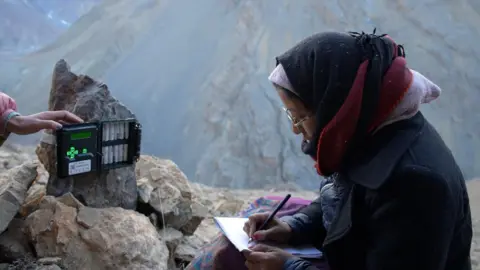
Along with pugmarks, the team looks for other signs, including scrapes and scent‑marking spots, before carefully fixing a camera to a rock along the trail.
One woman then carries out a “walk test”, crawling along the path to check whether the camera’s height and angle will capture a clear image.
The group then moves on to older sites, retrieving memory cards and replacing batteries installed weeks earlier.
By mid-afternoon, they return to camp to log and analyse the images using specialised software – tools many had never encountered before.
“I studied only until grade five,” says Chhering Lanzom. “At first, I was scared to use the computer. But slowly, we learned how to use the keyboard and mouse.”
The women joined the camera-trapping programme in 2023. Initially, conservation was not their motivation. But winters in the Spiti Valley are long and quiet, with little agricultural work to fall back on.
“At first, this work on snow leopards didn’t interest us,” Lobzang says. “We joined because we were curious and we could earn a small income.”
The women earn between 500 ($5.46; £4) and 700 rupees a day.
But beyond the money, the work has helped transform how the community views the animal.
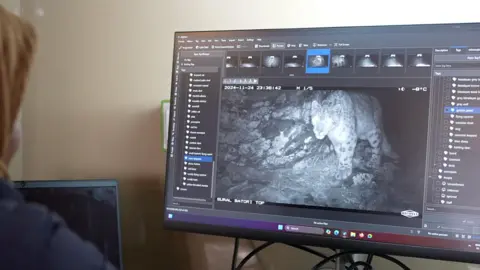
“Earlier, we thought the snow leopard was our enemy,” says Dolma Zangmo, a local resident. “Now we think their conservation is important.”
Alongside survey work, the women help villagers access government insurance schemes for their livestock and promote the use of predator‑proof corrals – stone or mesh enclosures that protect animals at night.
Their efforts come at a time of growing recognition for the region. Spiti Valley has recently been included in the Cold Desert Biosphere Reserve, a Unesco-recognised network aimed at conserving fragile ecosystems while supporting local livelihoods.
As climate change reshapes the fragile trans-Himalayan landscape, conservationists say such community participation will be crucial to safeguarding species like the snow leopard.
“Once communities are involved, conservation becomes more sustainable,” says Deepshikha Sharma, programme manager with NCF’s High Altitudes initiative.
“These women are not just assisting, they are becoming practitioners of wildlife conservation and monitoring,” she adds.
As for the women, their work makes them feel closer to their home, the village and the mountains that raised them, they say.
“We were born here, this is all we know,” Lobzang says. “Sometimes we feel afraid because these snow leopards are after all predatory animals, but this is where we belong.”
[BBC]
Features
Freedom for giants: What Udawalawe really tells about human–elephant conflict
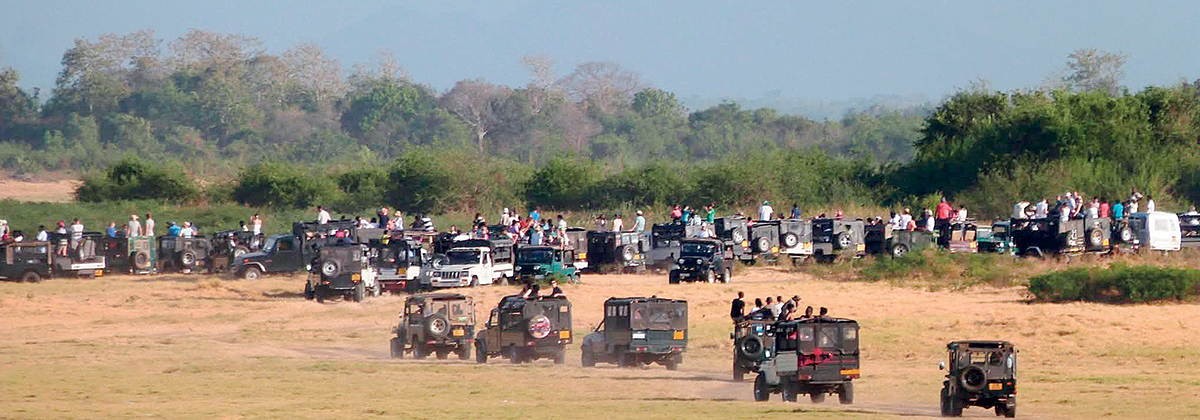
If elephants are truly to be given “freedom” in Udawalawe, the solution is not simply to open gates or redraw park boundaries. The map itself tells the real story — a story of shrinking habitats, broken corridors, and more than a decade of silent but relentless ecological destruction.
“Look at Udawalawe today and compare it with satellite maps from ten years ago,” says Sameera Weerathunga, one of Sri Lanka’s most consistent and vocal elephant conservation activists. “You don’t need complicated science. You can literally see what we have done to them.”
What we commonly describe as the human–elephant conflict (HEC) is, in reality, a land-use conflict driven by development policies that ignore ecological realities. Elephants are not invading villages; villages, farms, highways and megaprojects have steadily invaded elephant landscapes.
Udawalawe: From Landscape to Island
Udawalawe National Park was once part of a vast ecological network connecting the southern dry zone to the central highlands and eastern forests. Elephants moved freely between Udawalawe, Lunugamvehera, Bundala, Gal Oya and even parts of the Walawe river basin, following seasonal water and food availability.
Today, Udawalawe appears on the map as a shrinking green island surrounded by human settlements, monoculture plantations, reservoirs, electric fences and asphalt.
“For elephants, Udawalawe is like a prison surrounded by invisible walls,” Sameera explains. “We expect animals that evolved to roam hundreds of square nationakilometres to survive inside a box created by humans.”
Elephants are ecosystem engineers. They shape forests by dispersing seeds, opening pathways, and regulating vegetation. Their survival depends on movement — not containment. But in Udawalawa, movement is precisely what has been taken away.
Over the past decade, ancient elephant corridors have been blocked or erased by:
Irrigation and agricultural expansion
Tourism resorts and safari infrastructure
New roads, highways and power lines
Human settlements inside former forest reserves
“The destruction didn’t happen overnight,” Sameera says. “It happened project by project, fence by fence, without anyone looking at the cumulative impact.”
The Illusion of Protection
Sri Lanka prides itself on its protected area network. Yet most national parks function as ecological islands rather than connected systems.
“We think declaring land as a ‘national park’ is enough,” Sameera argues. “But protection without connectivity is just slow extinction.”
Udawalawe currently holds far more elephants than it can sustainably support. The result is habitat degradation inside the park, increased competition for resources, and escalating conflict along the boundaries.
“When elephants cannot move naturally, they turn to crops, tanks and villages,” Sameera says. “And then we blame the elephant for being a problem.”
The Other Side of the Map: Wanni and Hambantota
Sameera often points to the irony visible on the very same map. While elephants are squeezed into overcrowded parks in the south, large landscapes remain in the Wanni, parts of Hambantota and the eastern dry zone where elephant density is naturally lower and ecological space still exists.
“We keep talking about Udawalawe as if it’s the only place elephants exist,” he says. “But the real question is why we are not restoring and reconnecting landscapes elsewhere.”
The Hambantota MER (Managed Elephant Reserve), for instance, was originally designed as a landscape-level solution. The idea was not to trap elephants inside fences, but to manage land use so that people and elephants could coexist through zoning, seasonal access, and corridor protection.
“But what happened?” Sameera asks. “Instead of managing land, we managed elephants. We translocated them, fenced them, chased them, tranquilised them. And the conflict only got worse.”
The Failure of Translocation
For decades, Sri Lanka relied heavily on elephant translocation as a conflict management tool. Hundreds of elephants were captured from conflict zones and released into national parks like Udawalawa, Yala and Wilpattu.
The logic was simple: remove the elephant, remove the problem.
The reality was tragic.
“Most translocated elephants try to return home,” Sameera explains. “They walk hundreds of kilometres, crossing highways, railway lines and villages. Many die from exhaustion, accidents or gunshots. Others become even more aggressive.”
Scientific studies now confirm what conservationists warned from the beginning: translocation increases stress, mortality, and conflict. Displaced elephants often lose social structures, familiar landscapes, and access to traditional water sources.
“You cannot solve a spatial problem with a transport solution,” Sameera says bluntly.
In many cases, the same elephant is captured and moved multiple times — a process that only deepens trauma and behavioural change.
Freedom Is Not About Removing Fences
The popular slogan “give elephants freedom” has become emotionally powerful but scientifically misleading. Elephants do not need symbolic freedom; they need functional landscapes.
Real solutions lie in:
Restoring elephant corridors
Preventing development in key migratory routes
Creating buffer zones with elephant-friendly crops
Community-based land-use planning
Landscape-level conservation instead of park-based thinking
“We must stop treating national parks like wildlife prisons and villages like war zones,” Sameera insists. “The real battlefield is land policy.”
Electric fences, for instance, are often promoted as a solution. But fences merely shift conflict from one village to another.
“A fence does not create peace,” Sameera says. “It just moves the problem down the line.”
A Crisis Created by Humans
Sri Lanka loses more than 400 elephants and nearly 100 humans every year due to HEC — one of the highest rates globally.
Yet Sameera refuses to call it a wildlife problem.
“This is a human-created crisis,” he says. “Elephants are only responding to what we’ve done to their world.”
From expressways cutting through forests to solar farms replacing scrublands, development continues without ecological memory or long-term planning.
“We plan five-year political cycles,” Sameera notes. “Elephants plan in centuries.”
The tragedy is not just ecological. It is moral.
“We are destroying a species that is central to our culture, religion, tourism and identity,” Sameera says. “And then we act surprised when they fight back.”
The Question We Avoid Asking
If Udawalawe is overcrowded, if Yala is saturated, if Wilpattu is bursting — then the real question is not where to put elephants.
The real question is: Where have we left space for wildness in Sri Lanka?
Sameera believes the future lies not in more fences or more parks, but in reimagining land itself.
“Conservation cannot survive as an island inside a development ocean,” he says. “Either we redesign Sri Lanka to include elephants, or one day we’ll only see them in logos, statues and children’s books.”
And the map will show nothing but empty green patches — places where giants once walked, and humans chose. roads instead.
By Ifham Nizam
Features
Challenges faced by the media in South Asia in fostering regionalism
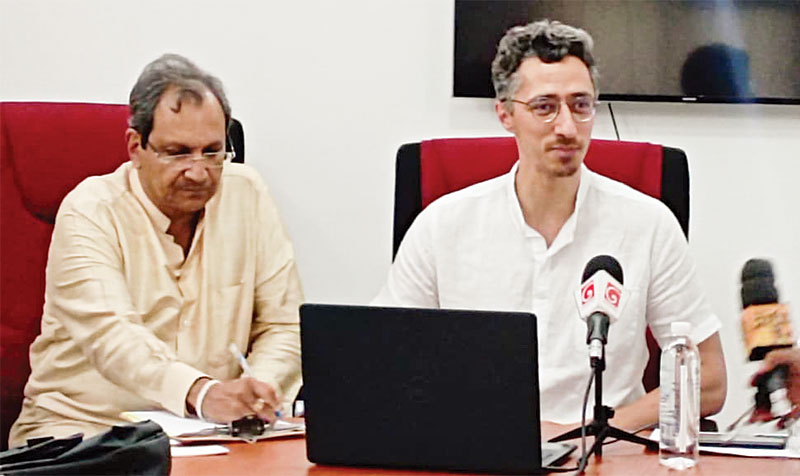
 SAARC or the South Asian Association for Regional Cooperation has been declared ‘dead’ by some sections in South Asia and the idea seems to be catching on. Over the years the evidence seems to have been building that this is so, but a matter that requires thorough probing is whether the media in South Asia, given the vital part it could play in fostering regional amity, has had a role too in bringing about SAARC’s apparent demise.
SAARC or the South Asian Association for Regional Cooperation has been declared ‘dead’ by some sections in South Asia and the idea seems to be catching on. Over the years the evidence seems to have been building that this is so, but a matter that requires thorough probing is whether the media in South Asia, given the vital part it could play in fostering regional amity, has had a role too in bringing about SAARC’s apparent demise.
That South Asian governments have had a hand in the ‘SAARC debacle’ is plain to see. For example, it is beyond doubt that the India-Pakistan rivalry has invariably got in the way, particularly over the past 15 years or thereabouts, of the Indian and Pakistani governments sitting at the negotiating table and in a spirit of reconciliation resolving the vexatious issues growing out of the SAARC exercise. The inaction had a paralyzing effect on the organization.
Unfortunately the rest of South Asian governments too have not seen it to be in the collective interest of the region to explore ways of jump-starting the SAARC process and sustaining it. That is, a lack of statesmanship on the part of the SAARC Eight is clearly in evidence. Narrow national interests have been allowed to hijack and derail the cooperative process that ought to be at the heart of the SAARC initiative.
However, a dimension that has hitherto gone comparatively unaddressed is the largely negative role sections of the media in the SAARC region could play in debilitating regional cooperation and amity. We had some thought-provoking ‘takes’ on this question recently from Roman Gautam, the editor of ‘Himal Southasian’.
Gautam was delivering the third of talks on February 2nd in the RCSS Strategic Dialogue Series under the aegis of the Regional Centre for Strategic Studies, Colombo, at the latter’s conference hall. The forum was ably presided over by RCSS Executive Director and Ambassador (Retd.) Ravinatha Aryasinha who, among other things, ensured lively participation on the part of the attendees at the Q&A which followed the main presentation. The talk was titled, ‘Where does the media stand in connecting (or dividing) Southasia?’.
Gautam singled out those sections of the Indian media that are tamely subservient to Indian governments, including those that are professedly independent, for the glaring lack of, among other things, regionalism or collective amity within South Asia. These sections of the media, it was pointed out, pander easily to the narratives framed by the Indian centre on developments in the region and fall easy prey, as it were, to the nationalist forces that are supportive of the latter. Consequently, divisive forces within the region receive a boost which is hugely detrimental to regional cooperation.
Two cases in point, Gautam pointed out, were the recent political upheavals in Nepal and Bangladesh. In each of these cases stray opinions favorable to India voiced by a few participants in the relevant protests were clung on to by sections of the Indian media covering these trouble spots. In the case of Nepal, to consider one example, a young protester’s single comment to the effect that Nepal too needed a firm leader like Indian Prime Minister Narendra Modi was seized upon by the Indian media and fed to audiences at home in a sensational, exaggerated fashion. No effort was made by the Indian media to canvass more opinions on this matter or to extensively research the issue.
In the case of Bangladesh, widely held rumours that the Hindus in the country were being hunted and killed, pogrom fashion, and that the crisis was all about this was propagated by the relevant sections of the Indian media. This was a clear pandering to religious extremist sentiment in India. Once again, essentially hearsay stories were given prominence with hardly any effort at understanding what the crisis was really all about. There is no doubt that anti-Muslim sentiment in India would have been further fueled.
Gautam was of the view that, in the main, it is fear of victimization of the relevant sections of the media by the Indian centre and anxiety over financial reprisals and like punitive measures by the latter that prompted the media to frame their narratives in these terms. It is important to keep in mind these ‘structures’ within which the Indian media works, we were told. The issue in other words, is a question of the media completely subjugating themselves to the ruling powers.
Basically, the need for financial survival on the part of the Indian media, it was pointed out, prompted it to subscribe to the prejudices and partialities of the Indian centre. A failure to abide by the official line could spell financial ruin for the media.
A principal question that occurred to this columnist was whether the ‘Indian media’ referred to by Gautam referred to the totality of the Indian media or whether he had in mind some divisive, chauvinistic and narrow-based elements within it. If the latter is the case it would not be fair to generalize one’s comments to cover the entirety of the Indian media. Nevertheless, it is a matter for further research.
However, an overall point made by the speaker that as a result of the above referred to negative media practices South Asian regionalism has suffered badly needs to be taken. Certainly, as matters stand currently, there is a very real information gap about South Asian realities among South Asian publics and harmful media practices account considerably for such ignorance which gets in the way of South Asian cooperation and amity.
Moreover, divisive, chauvinistic media are widespread and active in South Asia. Sri Lanka has a fair share of this species of media and the latter are not doing the country any good, leave alone the region. All in all, the democratic spirit has gone well into decline all over the region.
The above is a huge problem that needs to be managed reflectively by democratic rulers and their allied publics in South Asia and the region’s more enlightened media could play a constructive role in taking up this challenge. The latter need to take the initiative to come together and deliberate on the questions at hand. To succeed in such efforts they do not need the backing of governments. What is of paramount importance is the vision and grit to go the extra mile.
-

 Business6 days ago
Business6 days agoHayleys Mobility ushering in a new era of premium sustainable mobility
-

 Business3 days ago
Business3 days agoSLIM-Kantar People’s Awards 2026 to recognise Sri Lanka’s most trusted brands and personalities
-

 Business6 days ago
Business6 days agoAdvice Lab unveils new 13,000+ sqft office, marking major expansion in financial services BPO to Australia
-

 Business6 days ago
Business6 days agoArpico NextGen Mattress gains recognition for innovation
-

 Business5 days ago
Business5 days agoAltair issues over 100+ title deeds post ownership change
-

 Editorial6 days ago
Editorial6 days agoGovt. provoking TUs
-

 Business5 days ago
Business5 days agoSri Lanka opens first country pavilion at London exhibition
-

 Business4 days ago
Business4 days agoAll set for Global Synergy Awards 2026 at Waters Edge















